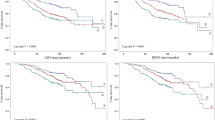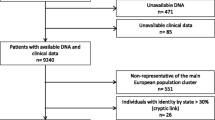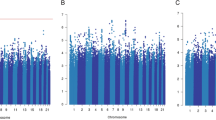Abstract
Lymph node metastases and tumor characteristics predict breast cancer prognosis but correlate imperfectly with likelihood of metastatic relapse. Discovery of genetic polymorphisms affecting metastasis may improve identification of patients requiring aggressive adjuvant therapy to prevent recurrence. We investigated associations between several variants in the BRMS1 and SIPA1 metastasis-modifying genes and lymph node metastases, tumor subtype and grade, recurrence, disease-free survival, and overall survival. This cross-sectional and prospective prognostic analysis included 859 patients who received surgery for incident breast cancer at Roswell Park Cancer Institute, participated in the DataBank and BioRepository shared resource, and had DNA, clinical, and pathology data available for analysis. Genotyping for BRMS1 (rs11537993, rs3116068, and rs1052566) and SIPA1 (rs75894763, rs746429, rs3741378, and rs2306364) polymorphisms was performed using Sequenom® iPLEX Gold and Taqman® real-time PCR assays. Logistic and Cox proportional hazards regressions were used to estimate odds ratios (OR) and hazard ratios (HR), respectively. BRMS1 rs1052566 heterozygous individuals were more likely to have node-positive tumors (OR = 1.58, 95 % CI 1.13–2.23), although there was no dose–response relationship, and those with at least one variant allele were less likely to have the luminal B subtype (AG + AA: OR = 0.59, 95 % CI 0.36–0.98). BRMS1 rs3116068 was associated with increased likelihood of having the luminal B and the HER2-enriched tumor subtype (P trend = 0.03). Two SIPA1 SNPs, rs746429 and rs2306364, were associated with decreased risk of triple-negative tumors (P trend = 0.04 and 0.07, respectively). Presence of 8 or more risk alleles was associated with an increased likelihood of having a node-positive tumor (OR = 2.14, 95 % CI 1.18–3.36, P trend = 0.002). There were no significant associations with survival. Polymorphisms in metastasis-associated genes may be related to tumor characteristics and lymph node metastasis, but not survival. Future evaluation of metastasis-modifying gene variants is necessary to better understand the biology of metastasis.
Similar content being viewed by others
Abbreviations
- BMI:
-
Body mass index
- BRMS1:
-
Breast cancer metastasis suppressor 1
- CI:
-
Confidence interval
- DBBR:
-
DataBank and BioRepository
- DCIS:
-
Ductal carcinoma in situ
- DFS:
-
Disease-free survival
- ER:
-
Estrogen receptor
- HER2:
-
Human epidermal growth factor receptor 2
- HR:
-
Hazard ratio
- HRT:
-
Hormone replacement therapy
- NCCN:
-
National Comprehensive Cancer Network
- OR:
-
Odds ratio
- OS:
-
Overall survival
- PR:
-
Progesterone receptor
- RPCI:
-
Roswell Park Cancer Institute
- SIPA1:
-
Signal-induced proliferation-associated 1
- SNP:
-
Single nucleotide polymorphism
- TTR:
-
Time to recurrence
References
Cancer facts and figures (2013) American Cancer Society
Higgins MJ, Wolff AC (2008) Therapeutic options in the management of metastatic breast cancer. Oncology 22:614–623 discussion 623, 627–9
Nguyen DX, Bos PD, Massagué J (2009) Metastasis: from dissemination to organ-specific colonization. Nat Rev Cancer 9:274–284
Nathanson SD, Kwon D, Kapke A, Alford SH, Chitale D (2009) The role of lymph node metastasis in the systemic dissemination of breast cancer. Ann Surg Oncol 16:3396–3405
Tresserra F, Rodriguez I, García-Yuste M, Grases PJ, Ara C, Fabregas R (2007) Tumor size and lymph node status in multifocal breast cancer. Breast J 13:68–71
Koscielny S, Arriagada R, Adolfsson J, Fornander T, Bergh J (2009) Impact of tumour size on axillary involvement and distant dissemination in breast cancer. Brit J Cancer 101:902–907
Payne SJL, Bowen RL, Jones JL, Wells Ca (2008) Predictive markers in breast cancer—the present. Histopathology 52:82–90
Stafford LJ, Vaidya KS, Welch DR (2008) Metastasis suppressors genes in cancer. Int J Biochem Cell B 40:874–891
Hedley BD, Vaidya KS, Phadke P, MacKenzie L, Dales DW, Postenka CO, MacDonald IC, Chambers AF (2008) BRMS1 suppresses breast cancer metastasis in multiple experimental models of metastasis by reducing solitary cell survival and inhibiting growth initiation. Clin Exp Metastas 25:727–740
Seraj MJ, Samant RS, Verderame MF, Welch DR (2000) Functional evidence for a novel human breast carcinoma metastasis suppressor, BRMS1, encoded at chromosome 11q13. Cancer Res 60:2764–2769
Phadke Pa, Vaidya KS, Nash KT, Hurst DR, Welch DR (2008) BRMS1 suppresses breast cancer experimental metastasis to multiple organs by inhibiting several steps of the metastatic process. Am J Path 172:809–817
Liu Y, Smith PW, Jones DR (2006) Breast cancer metastasis suppressor 1 functions as a corepressor by enhancing histone deacetylase 1-mediated deacetylation of RelA/p65 and promoting apoptosis. Mol Cell Biol 26:8683–8696
Hicks DG, Yoder BJ, Short S, Tarr S, Prescott N, Crowe JP, Dawson AE, Budd GT, Sizemore S, Cicek M, Choueiri TK, Tubbs RR, Gaile D, Nowak N, Accavitti-Loper MA, Frost AR, Welch DR, Casey G (2006) Loss of breast cancer metastasis suppressor 1 protein expression predicts reduced disease-free survival in subsets of breast cancer patients. Clin Cancer Res 12:6702–6708
Zhang Z, Yamashita H, Toyama T, Yamamoto Y, Kawasoe T, Iwase H (2006) Reduced expression of the breast cancer metastasis suppressor 1 mRNA is correlated with poor progress in breast cancer. Clin Cancer Res 12:6410–6414
Kelly LM, Buggy Y, Hill A, O’Donovan N, Duggan C, McDermott EW, O’Higgins NJ, Young L, Duffy MJ (2005) Expression of the breast cancer metastasis suppressor gene, BRMS1, in human breast carcinoma: lack of correlation with metastasis to axillary lymph nodes. Tumour Biol 26:213–216
Stark AM, Tongers K, Maass N, Mehdorn HM, Held-Feindt J (2005) Reduced metastasis-suppressor gene mRNA-expression in breast cancer brain metastases. J Cancer Res Clin 131:191–198
Lombardi G, Di Cristofano C, Capodanno A, Iorio MC, Aretini P, Isola P, Tancredi M, Collecchi P, Naccarato AG, Porta RP, Bevilacqua G, Caligo MA (2007) High level of messenger RNA for BRMS1 in primary breast carcinomas is associated with poor prognosis. Int J Cancer 120:1169–1178
Tsukamoto N, Hattori M, Yang H, Bos JL, Minato N (1999) Rap1 GTPase-activating protein SPA-1 negatively regulates cell adhesion. J Biol Chem 274:18463–18469
Crawford NPS, Walker RC, Lukes L, Officewala JS, Williams RW, Hunter KW (2008) The diasporin pathway: a tumor progression-related transcriptional network that predicts breast cancer survival. Clin Exp Metastas 25:357–369
Park YG, Zhao X, Lesueur F, Lowy DR, Lancaster M, Pharoah P, Qian X, Hunter KW, Yang H (2005) Sipa1 is a candidate for the metastasis efficiency modifier locus Mtes1. Nat Genet 37:1055–1062
Crawford NPS, Ziogas A, Peel DJ, Hess J, Anton-Culver H, Hunter KW (2006) Germline polymorphisms in SIPA1 are associated with metastasis and other indicators of poor prognosis in breast cancer. Breast Cancer Res 8:R16
Gaudet MM, Hunter K, Pharoah P, Dunning AM, Driver K, Sherman M, Peplonska B, Brinton LA, Lissowska J, Chanock S, Garcia-Closas M (2009) Genetic variation in SIPA1 in relation to breast cancer risk and survival after breast cancer diagnosis. Int J Cancer 124:1716–1720
Hsieh S-M, Look MP, Sieuwerts AM, Foekens Ja, Hunter KW (2009) Distinct inherited metastasis susceptibility exists for different breast cancer subtypes: a prognosis study. Breast Cancer Res 11:R75
Ambrosone CB, Nesline MK, Davis W (2006) Establishing a cancer center data bank and biorepository for multidisciplinary research. Cancer Epidem Biomar 15:1575–1577
Sherry ST, Ward MH, Kholodov M, Baker J, Phan L, Smigielski EM, Sirotkin K (2001) dbSNP: the NCBI database of genetic variation. Nucleic Acids Res 29:308–311
Meehan WJ, Welch DR (2003) Breast cancer metastasis suppressor 1: update. Clin Exp Metastas 20:45–50
Meehan WJ, Samant RS, Hopper JE, Carrozza MJ, Shevde LA, Workman JL, Eckert KA, Verderame MF, Welch DR (2004) Breast cancer metastasis suppressor 1 (BRMS1) forms complexes with retinoblastoma-binding protein 1 (RBP1) and the mSin3 histone deacetylase complex and represses transcription. J Biol Chem 279:1562–1569
Acknowledgments
This research was supported by a gift from the Jayne and Philip Hubbell Family. MRR is supported by DAMD W81XWH-11-1-0024, a predoctoral fellowship from the Department of Defense Breast Cancer Research Program, and previously supported by R25-CA11395102, an NCI predoctoral award. CBA is a recipient of funding from the Breast Cancer Research Foundation. Biospecimens and data were obtained from the RPCI DataBank and Biorepository, and genotyping was performed in the RPCI Genomics Core Facility, both of which are Cancer Center Support Grant Shared Resources supported by National Institutes of Health P30 CA016056-27. The funding agents played no role in any part of the study, including the design, collection, analysis and interpretation of the data, in the writing of the manuscript, or the decision to submit the manuscript for publication.
Conflict of interests
The authors declare that they have no conflict of interests.
Ethical standard
This work complies with all ethical standards and current laws of the USA.
Author information
Authors and Affiliations
Corresponding author
Rights and permissions
About this article
Cite this article
Roberts, M.R., Hong, CC., Edge, S.B. et al. Case-only analyses of the associations between polymorphisms in the metastasis-modifying genes BRMS1 and SIPA1 and breast tumor characteristics, lymph node metastasis, and survival. Breast Cancer Res Treat 139, 873–885 (2013). https://doi.org/10.1007/s10549-013-2601-3
Received:
Accepted:
Published:
Issue Date:
DOI: https://doi.org/10.1007/s10549-013-2601-3




